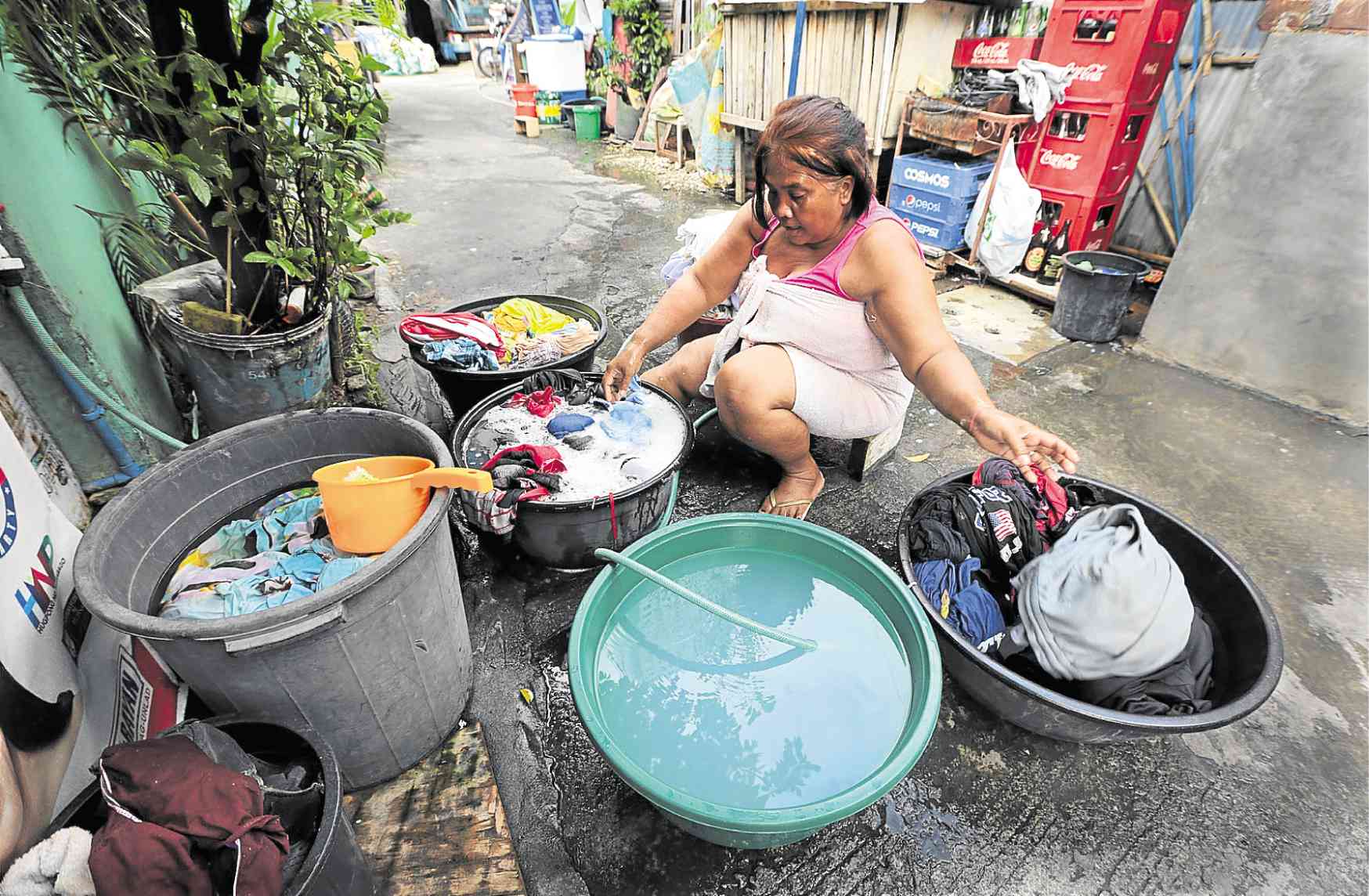‘The only thing on our minds is water’

WATER WOES Vic-Vic Arellano, a resident of Barangay South Triangle in Quezon City, does the laundry in a hurry, afraid that the water supply might be cut off anytime. Water concessionaires have announced a new round of service interruptions due to dipping dam levels. —GRIG C. MONTEGRANDE
MANILA, Philippines — Manila Water Co. Inc. may have announced a new schedule of water service interruptions effective on Tuesday but for some residents in Mandaluyong and Quezon City, the feeling of living in perpetual crisis that began at the peak of the supply shortage in March never went away.
Some residents of Barangays Barangka Drive and Barangka Ibaba in Mandaluyong City told the Inquirer on Wednesday that their water supply had not been normal all summer, while their taps had been completely dry since 3 p.m. on June 13 — five days before the water concessionaire’s announcement.
“The only thing we can think about is water,” said Sharon Mallanao who has lived for almost 40 years at the border of the two villages.
“Instead of thinking about what we’re going to eat, where we’re going to work, or how we’re going to live, the only thing on our minds at night is where we’re going to get water,” she added.
The scene in these communities gave off a striking sense of deja vu. Empty pails lined sidewalks while incensed and exhausted residents waited hours for fire trucks to arrive, just as they did when the crisis was first felt in March.
Article continues after this advertisement“We pay our bills on time, we do not owe them [Manila Water] any money,” said Alfredo Quinto, Mallanao’s neighbor for 20 years. “Why are we treated like this? All we are asking for is two hours each day with strong running water.”
Article continues after this advertisementNo bath, no work
Quinto, a company driver, said he had not worked for the past four days because there was no water for a bath. Several children missed school for the same reason. Zoilo Balan, an 80-year-old who repairs shoes for a living, had to bike back and forth to a refilling station to fill several containers.
The sudden loss of water without any advisory had paralyzed them, Mallanao said.
“We know the dam levels are critical, but the interruptions should be fair,” she stressed. “Manila Water gives a schedule but it’s all for naught. They don’t follow it.”
On Wednesday morning, Angat Dam’s elevation was at 161.30 meters above sea level (masl) and going down at a rate of around 0.4 meter daily, according to the Philippine Atmospheric, Geophysical and Astronomical Services Administration.
Critical level
It was expected to breach the critical level of 160 masl by the weekend and the National Water Resources Board urged Metro Manila consumers to conserve water.
The dam supplies over 90 percent of Metro residents’ water needs.
Leonila Orca, a “sari-sari” store owner at Barangka Ibaba, said she had noted the service interruptions on a calendar since they first lost water on March 7. In April, there would be water from around 5 a.m. to midafternoon if they were lucky. But other times, they would have water for just 15 minutes.
“When there’s a crisis like this, there’s no rich or poor,” Orca said. “Everyone struggles.”
She has started buying water exclusively from grocery stores because other residents fell ill after drinking from refilling stations. Even now, in Mallanao’s area, the water from fire trucks was at times too dirty even for washing dishes.
Four water refilling stations have already closed down in one small section of Barangka Ibaba since March, according to Jun Ilaw, owner of Alf’s water refilling station. He was also currently trying to sell his own store due to the crisis.
“It is hard for me because I have barely made money since March, but I have to pay my employees,” he said. “We still charge P35 per container, the same price when we started… Customers will not be able to afford it if I raise the price.”
Laundry shop Bubbles Bee owner Nelson Macabanta, of Barangay Plainview, has been dealing with the lack of water since Monday.
“We have lost a lot [of money],” Macabanta told the Inquirer. He said they were behind work as a result and was contemplating whether or not they should continue operating.
Mimi Potente, who runs Katherine Eatery, also in Barangay Plainview, has resorted to buying mineral water to wash the dishes. On Tuesday, she used up to 5 gallons which cost P40 each.
In Quezon City, residents have been complaining about the worsening water supply and inconsistent interruption schedules.
Jonah Ruth Tonido, 25, a business analyst at a company in Ortigas, said she had to take a half-day off from work when the water supply in her rented apartment in Barangay Culiat was suddenly cut off on Wednesday night.
Still abnormal
Since the water crisis last March, Tonido said the service in the barangay had yet to return to normal. As a result, they have had to adjust their routine around an eight-hour water interruption schedule, or from 9 p.m. to 5 a.m.
“The water interruption has immensely affected the routine of working professionals like me. But on Tuesday, when I came home from work [before 9 p.m.], there was not a single drop [coming] from our faucets. I had to go to work in the morning, but the taps were still dry. They could’ve issued an advisory earlier so we could prepare for it,” she said.
Since March, Vangie Candelario of Barangay San Martin de Porres said they had gotten used to a daily water rationing schedule of 4 a.m. to 5 p.m. But on Tuesday, their taps went dry starting at noon, a situation that lasted for 18 hours. —With reports from Carmela Reyes-Estrope, Jhesset O. Enano, Maxine Sta. Cruz and Moira Natividad.